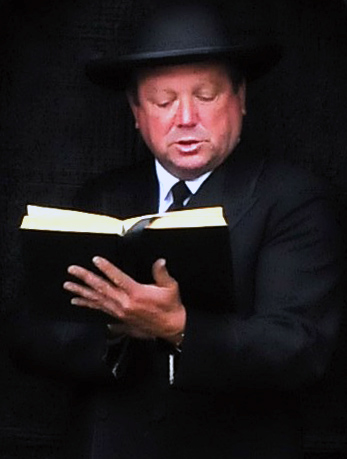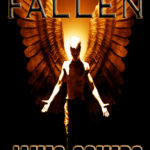7 Top Ways To Ensure Your Story Is Preachy
 Author Mike Duran posted an essay titled, “The Problem with Message Driven Fiction.” As usual, his post generated a good bit of comments. One of the themes arising in the comments is what makes a story “preachy.” As one commenter put it, no one says they want their story to be preachy. Yet, we find a lot of Christian fiction that is preachy. So it must be a more poplar goal than the commenters were willing to admit.
Author Mike Duran posted an essay titled, “The Problem with Message Driven Fiction.” As usual, his post generated a good bit of comments. One of the themes arising in the comments is what makes a story “preachy.” As one commenter put it, no one says they want their story to be preachy. Yet, we find a lot of Christian fiction that is preachy. So it must be a more poplar goal than the commenters were willing to admit.
Therefore, for those authors who do want to write preachy Christian fiction, I thought it would be a great service to list the seven best ways to accomplish that worthy task. After all, without a preacher, how will they hear? So here they are in reverse order.
Seven
Ensure you have some perfect Christian characters. All by itself, this does not guarantee preachiness, but without it, you have no one to deliver all those poignant lines of spiritual wisdom. And what is a good Christian story without perfect Christians in them to inspire us to such perfection? Someone needs to be the preacher.
Six
Also ensure you have characters that not only need salvation, but will get it by the end of the story. Preferably in an altar call after hearing a sermon, because they by chance stumbled upon a church and decided for the first time in their life to go in because a street preacher called out a Bible verse and it spoke to him or her. Again, doesn’t ensure preachiness, but without it, the opportunity for preaching gets scarce.
Five
Make sure the characters end up in a church service at some point in the story. What is more natural to preach to the reader than for your character to end up in a service and listen to a sermon that speaks to them? If the church factors into your story, great! Take advantage of that to get a salvation sermon in. If not? I’m sure you can find somewhere to tack that on.
Four
Sprinkle plenty of Bible verses throughout the story. Especially if you have that perfect Christian pastor or friend who can expound on the meaning in those verses, just in case it isn’t clear enough by itself. After all, most Christians don’t go around all day quoting Bible verses, and may not know what they really mean.
Three
Don’t just show, tell. Don’t trust your reader to be smart enough to get what you are attempting to convey in the character’s actions and dialog. Make sure one of the characters or the narrator takes some time to fully explain what the reader should understand from what just happened. So if someone rushes into a burning building and saves an baby from the inferno, don’t forget to tell the reader how that selfless act illustrates how far God’s grace has brought them from the sinner they used to be.
Two
Make sure the plot offers plenty of chances for preaching, either by the perfect Christian or a pastor/evangelist. Remember, plot is to service the message, and that requires getting your characters into situations or discussions where they learn the truth of the Gospel message and other Christian values. Good places to make sure your characters go to are the jail, a bar (but make him/her not like it), the hospital because of some illness or wreck, or a church (see point five above).
One
And the number one way to ensure your fictional stories are preachy: say every truth you wish to convey at least three times. Every sermon has three point, and the Trinity is three persons. The Bible did it and look how popular it is. The formula is tell, show, and tell.
Do you have other methods to ensure preachiness? Don’t keep them hidden under a bushel, do tell.
————————————–
This article originally appeared on R. L. Copple’s blog, August, 2011.







































I’d say this applies to pretty much every Christian movie I’ve ever seen as well. It is not an authentic Christian book unless there is a gospel presentation and an altar call, regardless of whether it remotely fits, right? But some publishers agree with that premise. Really, it becomes a lazy shortcut. A well written story preaches the gospel by its story and it characters. It doesn’t need explanation and preaching. But a writer who wants to put the message first and the story second ends up doing neither well. The message is stilted and the story is contrived. Thanks for reminding us.
Entertaining article. I guess for me the question is, “Why is preachy fiction (Christian or not) so pervasive? Why do so many folks put up with an insult to their intelligence?” I went back and watched one of the Terminators (first or second, I don’t remember), and it surprised me how preachy it was. I didn’t remember it being that way.
So why? What besides laziness brings the cows home preaching to the pasture?
(You see what I did there? “Pasture” sounds like “pastor.” In the interest of being preachy, I thought I’d better point that out rather than letting you find it or miss it on your own.)
Maybe the intent is right, but something else is disconnected. We don’t want people to miss the good thing we’ve found.
Even preaching can be preachy, if it runs over the same old points Sunday after Sunday. Like the gospel (and I love it, don’t get me wrong) is the only thing that’s in the Bible. I’m concerned hearing it again and again can numb you to it, which is devastatingly dangerous.
It’d be ambitious but also great to see “A brief history of preachy Christian fiction.”
Matthias,
Why do people do it? Could be lots of reasons honestly. Probably the biggest reason is a Christian author wants to get a certain point/message across to his readers, which in and of itself is not bad or wrong. Most fiction will convey some type of theme, overall message, moral values, etc., whether Christian or secular.
But many authors are afraid to do what Jesus did. Tell the story and let the reader/hearer see the point for themselves. Jesus didn’t explain the point of most of His parables, and for the few He did, only to his disciples. Never to the crowds. He wasn’t afraid to let the hearer of His parables miss His point. Rather, He trusted that if a person was ready to see it, they would, and it would hit home to those who needed it.
We tend, when telling a story with a point, want to highlight that point and make sure the reader got the message by, in one form or fashion, explaining it. It isn’t good enough to show the message, there needs to be a point where you have the equivalent of an “and the moral of this story is . . .” We hate ambiguity in conveying a message, by and large. So we revert to writing in a systematic theological statement in a format it isn’t designed for: a fiction story.
So I’d suggest the main reason isn’t laziness. The main reason is fear of being misunderstood, of either the message not coming through to someone, or that they will pick up the wrong message. Unless you make the point(s) clear, both of those are likely to happen. But I suggest in telling stories, we take that risk, even as Jesus did with His. In my opinion, this frees up the story to be used by God to get across a message that person may need to hear. If we narrow it down to one particular message through “here’s what this means” type exposition, it can straitjacket how God can use it.
My Reality Chronicles series with Splashdown books is very message oriented. In most of those stories, there is a particular message/moral I’m conveying. I’m not going to say I totally avoided preachiness, but for the most part, at least those who have spoken up, they don’t come across as preachy. It’s been interesting to see what people see the messages are. Some get messages I didn’t have in mind. See themes or values being promoted I didn’t envision in writing them. Yes, some of them aren’t always points I’d agree with. IMO, sometimes people got the wrong message from them, and if they understood it better, they might not have come away with those messages. It is a risk not being preachy. One I’m willing to take. But not everyone is comfortable with that risk. So they minimize it by adding in preaching. Or as I describe it, inserting non-fiction into fiction, which does neither any favors as they have two different goals.
I have shelves and shelves full of Christian fiction… and the vast majority of these books do not include any of these elements… yet somehow, the entire period in which these books were published is labeled as “preachy” by writers on the internet. I gave up long ago, right around the time I stopped reviewing Christian fiction, because it was a circular argument that I could never win.
“I don’t read Christian fiction because it’s all preachy.”
“What about this one? Or this one? Or this one? Or this one? Or this one?”
“Oh, well, I haven’t read those. They’re Christian fiction and Christian fiction is all preachy.”
Yes, Tim. I agree, not all Christian fiction is preachy. I don’t know what the %s are, and one would have to nail down an objective measurement of what constitutes “preachy” as that can be a very subjective term (we tend to not think something isn’t preachy if we agree with the points being made or the purpose, but do if we disagree).
But while there is a lot of preachy Christian fiction out there, there is also a lot that is not. And the really overt preachy stuff probably doesn’t make it through the publishers by and large, so some of that is filtered out. But having been an editor at an online mag for 2-3 years, I saw plenty of submissions I’d classify as preachy. Very few of those made it onto the magazine. But there were also a lot that were not.
So to clarify, I’m certainly not painting all Christian fiction here with a broad brush. Only highlighting the ways in which when it is preachy, what elements tend to make it that way. I’ve also seen secular preachy books as well.
But don’t mistake this as a call to avoid Christian fiction, or suggesting all Christian fiction is preachy, or that I personally avoid Christian fiction for this reason. That would be reading into the article something that simply isn’t there.